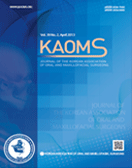Journal of the Korean Association of Oral and Maxillofacial Surgeons
- P-ISSN2234-7550
- E-ISSN2234-5930
- SCOPUS, KCI, ESCI
 ISSN : 2234-7550
ISSN : 2234-7550
Factors to consider for surgical in elderly patients with oral cancer
Abstract
At present, in Korea, due to developments in medicine and technology and an increasing mean lifespan, the expected lifetime for elderly people is increasing (at 70 years, the expected additional lifespan is 14.8 years for males and 18.3 years for females). However, among all causes of death, ma-lignant neoplasm is ranked first for all ages. Further, the incidence rate of oral cancer tends to increase with age. Thus, oral and maxillofacial surgeons have increased opportunity to experience the ‘oldest old’ patients with oral cancer. Elderly patients commonly have several comorbidities, poor general condition, limited socioeconomic support, fear of various postoperative complications, and perception of short for the rest of their life. In this situa-tion, the patient, caregiver, and surgeon often choose undergraded treatment rather than standard treatment for oral squamous cell carcinoma owing to patient age. In elderly patients with oral cancer, ablation of tumor or reconstructive surgery is challenging for surgeons. Oral and maxillofacial surgeons must evaluate carefully the patient’s medical condition and make a decision regarding treatment plans after sufficient discussion with patient and care-givers. We review the literature to consider the factors involved for deciding on a treatment plan regarding surgery in elderly patients with oral cancer.
- keywords
- Oral cancer, Surgery, Elderly patients
- Downloaded
- Viewed
- 0KCI Citations
- 0WOS Citations